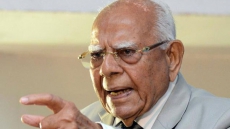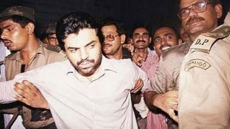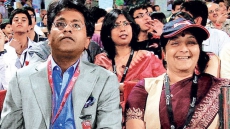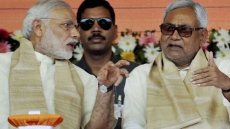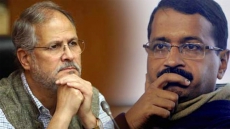Avul Pakir Jainulabdeen Abdul Kalam, who won popular acclaim as India's president from 2002 to 2007, died here on Monday evening after collapsing during a lecture at the IIM-Shillong.
"Kalam is no more," Meghalaya Chief Secretary P.B.O. Warjri told IANS, shortly after the 83-year-old president breathed his last at the Bethany Hospital where he was taken to from the management school.
"The former president was delivering a lecture on 'liveable planet' when he suddenly collapsed," IIM-Shillong official Merlvin Mukhim told IANS.
John Sailo Ryntathiang, director of the Bethany Hospital, said Kalam was brought "almost dead".

"He is in a critical condition," he said earlier. "We are trying to revive the patient." But Kalam could not be saved.
One of India's most accomplished scientists, Kalam was awarded the Padma Bhushan in 1981, Padma Vibhushan in 1990 and Bharat Ratna in 1997.
Born on October 15, 1931 at Rameshwaram in Tamil Nadu, Kalam went on to become one of the country's most celebrated aerospace and defence scientists.
He played a key role in India's nuclear test in 1998 when Atal Bihar Vajpayee was the prime minister.
Prime Minister Narendra Modi Condoles Kalam's Death

Prime Minister Narendra Modi on Monday condoled the death of former president A.P.J. Abdul Kalam, saying he was shocked and didn't have words to say.
"In this great shocking situation, I have no words to say...," he said.
Kalam, who was India's president from 2002 to 2007, died in a Shillong hospital on Monday evening. He was delivering a lecture at the IIM-Shillong when he suddenly collapsed, officials said.
Doctors said Kalam suffered cardiac arrest.
Kalam will be remembered fondly: Sonia
Congress president Sonia Gandhi on Monday said she was "deeply saddened" at the death of former president A.P.J Abdul Kalam, and he will be "missed dearly and remembered fondly by every Indian.
In a statement, she said she was deeply saddened at the passing away of Kalam.
"Kalam was a man of many parts - a scientist, an inventor, a visionary thinker and a teacher. Through his life and work, he ignited the minds of young people," Gandhi said.

She said that Kalam won over the hearts and minds of an entire nation with his warmth and wisdom during his term as president.
"He will be missed dearly and remembered fondly by every Indian," Gandhi said.
Kalam, who won popular acclaim as India's president from 2002 to 2007, died on Monday evening after collapsing during a lecture at the IIM-Shillong.
A.P.J. ABDUL KALAM: INDIA'S MISSILE MAN, AN INDOMITABLE SPIRIT
An enthusiast till the last for sharing ideas with students and youth, it was not surprising that former president A.P.J. Abdul Kalam was delivering a lecture at the IIM-Shillong when he collapsed and died in a hospital shortly afterwards.
His last tweet on Monday sounded enthusiastic "Going to Shillong.. to take course on Livable Planet earth at IIM." His handle @APJAbdulKalam, described him as "Scientist, teacher, learner and writer. Served as the 11th President of India (2002-07). Working for an economically developed nation by 2020."
Popularly known as India's "Missile Man", Avul Pakir Jainulabdeen Abdul Kalam crowned a illustrious acientific career with a term as india's first citizen after the then Atal Bihari Vajpayee-led National Democratic Alliance (NDA) government put forward his name as K.R. Narayanan's successor. He was recipient of India's highest civilian honour - the Bharat Ratna - in 1997.

One of India's best known scientists, Kalam was full of ideas on how to solve India's problems - on bridging the rural-urban divide through his pet concept of PURA or "Providing Urban amenities in Rural Areasa - for empowering villages, and also to use solar power in a big way to tide over India's energy needs.
PURA, Kalam said, was about giving a cluster of villages physical, electronic and knowledge connectivity and he had in mind creating about 7,000 PURAs across the country.
"I believe that connectivity is the key to bridging the rural-urban divide. The core-competence of the village will enable the production of competitive products for national and international markets. This will lead to rural enterprises which will create jobs in villages and lead to a vibrant economy in India's hinterland. That is how prosperity will emerge in the rural environment," he said in an interview to Wharton in 2008.
He enumerated five traits that a leader, especially the president of India, must have. "The leader must have vision. Without vision, you cannot be a leader. Second, the leader must be able to travel into an unexplored path. Normally the tendency is for people to travel along well-laid out ways. Third, the leader must know how to manage success, and even more importantly, failure.
"The fourth trait is that the leader should have the courage to make decisions. Fifth, the leader should have nobility in management. Every action of the leader should be transparent. And finally, the leader should work with integrity and succeed with integrity," he said in the same interview.
Kalam had also drawn up an elaborate plan to power Rashtrapati Bhavan with solar power, but his term ended before he could implement it. He believed that besides solar, India should also go in for nuclear energy and also bio fuels from jatropha plant and algae.

Born on October 15, 1931 at the Hindu pilgrim town of Rameswaram in Tamil Nadu, Kalam specialized in aeronautical engineering from Madras Institute of Technology and in 1958, joined the Defence Research and Development Organisation (DRDO).
He moved to the Indian Space Research Organisation (ISRO), where he was project director of India's first indigenous Satellite Launch Vehicle (SLV-III), which successfully injected the Rohini satellite in the near earth orbit in July 1980 and made India a member of the exclusive Space Club.
In his two-decade stint in the space agency, he was responsible for the evolution of ISRO's launch vehicle programme, particularly the PSLV configuration.
He rejoined DRDO in 1982, and planned the programme that produced a number of successful missiles, earning him the "Missile Man" nickname. He took up the responsibility of developing indigenous weapons as the chief executive of the Integrated Guided Missile Development Programme (IGMDP). He was responsible for the development and operationalisation of Agni and Prithvi missiles.
From 1992 to 1997, Kalam was scientific adviser to the defence minister, and later served as principal scientific adviser (1999-2001) to the government with the rank of cabinet minister.
He played a prominent role in the country's 1998 nuclear weapons tests, Pokhran-II, which established Kalam as a national hero.
He also gave thrust to self-reliance in defence systems by progressing multiple development tasks and mission projects such as Light Combat Aircraft.

In 1998, Kalam put forward a countrywide plan called Technology Vision 2020, which he described as a road map for transforming India from a less-developed to a developed society in 20 years, and called for, among other measures, increasing agricultural productivity, technology as a vehicle for economic growth, and widening access to health care and education.
From November 2001, Kalam was professor, technology and societal transformation at Anna University, Chennai.
He wrote four books - "Wings of Fire", "India 2020 - A Vision for the New Millennium", "My Journey" and "Ignited Minds - Unleashing the power within India".
One of the most distinguished scientists of India with the unique honour of receiving honorary doctorates from 30 universities and institutions, he was was awarded the Padma Bhushan in 1981, and Padma Vibhushan in 1990 before the Bharat Ratna.
Not many known that he was a poet too. His favourite poem was "The Vision", which he also recited in parliament.
"I climbed and climbed/Where is the peak, my Lord?
I ploughed and ploughed/Where is the knowledge treasure, my Lord?
I sailed and sailed/Where is the island of peace, my Lord?
Almighty, bless my nation/With vision and sweat resulting into happiness".

On July 22, Kalam tweeted: "An indomitable spirit stands on two feet.. vision and firm thought". It could serve as an apt description for him.
